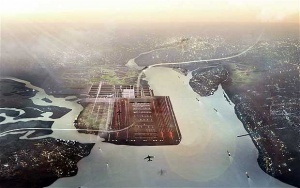Airports Commission sinks ‘Boris Island’ plan

Proposals for a new island airport in the Thames estuary have been rejected by the Airports Commission in the UK.
Dubbed ‘Boris Island’ due to the enthusiastic support of outgoing London mayor Boris Johnson, the plan was rejected due to fears over cost, economic disruption and the possible environmental impact.
The commission has been charged with examining the airport needs of the UK, with reference to alleviating shortages of capacity in the south-east of England.
It will report after the 2015 general election.
The estuary island airport proposal would have led to the development of a four-runway airport on the Isle of Grain in the Thames Estuary.
Its rejection leaves the expansion of either Heathrow or Gatwick airports as the commission’s preferred options.
Commission chairman Sir Howard Davies said: “We are not persuaded that a very large airport in the Thames estuary is the right answer to London’s and the UK’s connectivity needs.
“While we recognise the need for a hub airport, we believe this should be a part of an effective system of competing airports to meet the needs of a widely spread and diverse market like London’s.
“There are serious doubts about the delivery and operation of a very large hub airport in the estuary.
“The economic disruption would be huge and there are environmental hurdles which it may prove impossible, or very time-consuming to surmount.”
The decision not to shortlist Boris Island as an option leaves the commission with three alternatives.
These are now to add a third runway at Heathrow, lengthening an existing runway at Heathrow, and a new runway at Gatwick.
Branding the decision “myopic”, mayor Johnson said any expansion of Gatwick and Heathrow was untenable, with any future government likely to return to the estuary proposal.
Gatwick Airport chief executive Stewart Wingate said the commission’s decision was the right one.
He added: “This is an important juncture in the aviation debate because now Britain’s choice is clear; expand Gatwick and support genuine competition… or expand Heathrow.”
He said Gatwick’s case for another runway offered the cheapest, quickest and most low risk solution to the urgent need to expand airport capacity.
The move was also well received by the Board of Airline Representatives in the UK.
Bar UK chief executive, Dale Keller, said: “Airlines were never convinced that the Thames Estuary was either affordable or a convenient location for the majority of their customers.
“Since airlines and their passengers will ultimately have to pay for the development costs of the selected expansion site then the business case must stack up in order for the UK to remain globally competitive.”

